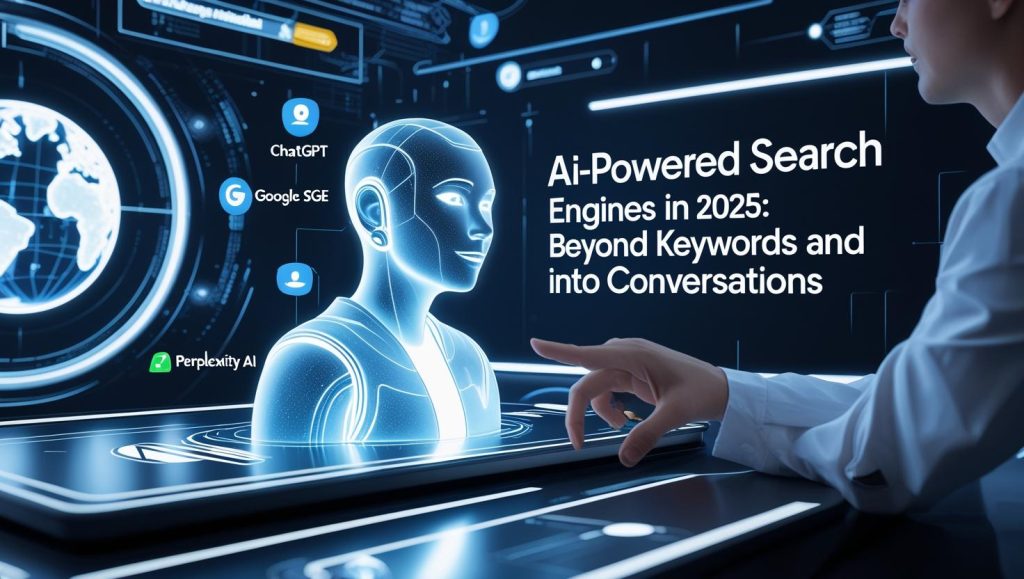
Introduction
Traditional keyword searches are becoming obsolete.
Search engines are evolving. No longer are we just typing keywords and scanning a list of blue links. In 2025, search has become an intuitive, AI-driven conversation. Thanks to powerful AI models like ChatGPT, Google’s SGE (Search Generative Experience), Perplexity AI, and others, the way we find information is fundamentally changing.
Thesis: In 2025, AI is making search smarter, faster, and more human—reshaping how we interact with information.
1. The Evolution of Search Engines
Search engines have come a long way since the days of AltaVista and the early Google era. Initially, search was based on simple keyword matching. Enter a word, and you’d get a list of websites that used that word most often.
Today, we’ve moved far beyond that. Thanks to Natural Language Processing (NLP) and Machine Learning (ML), search engines can now understand the meaning behind your queries. Whether you’re asking a question, describing a problem, or even speaking to your device, AI knows what you’re looking for.
This evolution has shifted us from search as a tool… to search as a conversation.
2. What Makes AI-Powered Search Different in 2025
So what sets AI search apart from traditional methods?
- Real-time learning: AI models constantly improve with user interactions.
- Context retention: Instead of one-off questions, AI remembers what you asked before.
- Conversational responses: Instead of pages of links, you get a clean, summarized answer.
- Multimodal input: You can search using text, voice, images, or even video.
- Citations & visuals: Answers often include charts, videos, and source links.
Search in 2025 is no longer a tool — it’s an intelligent assistant.
3. Key Players Leading the AI Search Race
Several major players are shaping the AI-powered search landscape:
- Google SGE (Search Generative Experience): Integrates generative AI directly into Google results.
- Microsoft Copilot + Bing AI: Offers chat-based results, integrated with Microsoft tools.
- Perplexity AI: A rising star focused on real-time, cited answers.
- You.com: Privacy-friendly AI search with a customizable interface.
- ChatGPT with Web Browsing: Delivers conversational answers backed by real-time internet access.
Each of these platforms brings a unique strength to the table — pushing the limits of what search can do.
4. Benefits of AI-Powered Search Engines
The shift to AI has brought a host of benefits:
- Faster, more accurate results: Get to the point — no need to dig through pages.
- Contextual understanding: Ask multi-step or follow-up questions with ease.
- Personalization: AI tailors answers to your intent and past behavior.
- Voice assistance: Making search more accessible for everyone — from kids to seniors.
For users, this means less time searching and more time getting answers.
5. Challenges and Concerns
But AI-powered search isn’t perfect.
- Accuracy issues: AI can “hallucinate” or generate incorrect facts.
- Bias: Training data can lead to skewed or incomplete answers.
- Privacy: Personalized search means more data collection — a concern for many.
- SEO disruption: Content creators must rethink strategies as AI summarizes instead of linking.
As with any new tech, it’s vital to balance innovation with responsibility.
6. The Future of SEO in the Age of AI Search
With AI changing how users search, SEO is undergoing its biggest transformation in years.
- From keywords to intent: Focus on answering real questions, not just ranking.
- Structured data & schema: Help AI understand and present your content better.
- Conversational content: Use natural, helpful language—just like users speak.
- Visual + voice optimization: Make your content friendly for voice assistants and image-based queries.
Tomorrow’s SEO is less about hacking algorithms — and more about helping people.
7. Real-World Applications & Examples
AI-powered search is being used across industries and age groups:
- Students use it for research and summaries.
- E-commerce platforms provide smarter product recommendations.
- Travel planning is now more interactive and intuitive.
- Healthcare professionals use AI to find relevant clinical data instantly.
- Legal teams streamline case research using AI-based tools.
These aren’t future predictions—they’re happening right now.
8. How Users Should Adapt
To make the most of AI search:
- Ask better questions: The more specific, the better the result.
- Use follow-ups: Don’t be afraid to ask “what next?”
- Verify facts: Always double-check critical information.
- Try multiple tools: Different platforms offer different strengths.
Your search skills still matter — but now it’s about asking like a human, not typing like a machine.
9. Conclusion
AI is revolutionizing how we search, moving from keywords to conversations, from static results to interactive experiences.
With tools like Google SGE, ChatGPT, and Perplexity AI leading the way, the future of search is smarter, more personal, and more intuitive.
🌐 Stay informed, adapt your strategies, and embrace this transformation.
🔗 Want to dive deeper? Read: Anthropic’s Claude Gets New Web Search Feature with Direct Links to Sources
Stay connected with us on HERE AND NOW AI & on:

